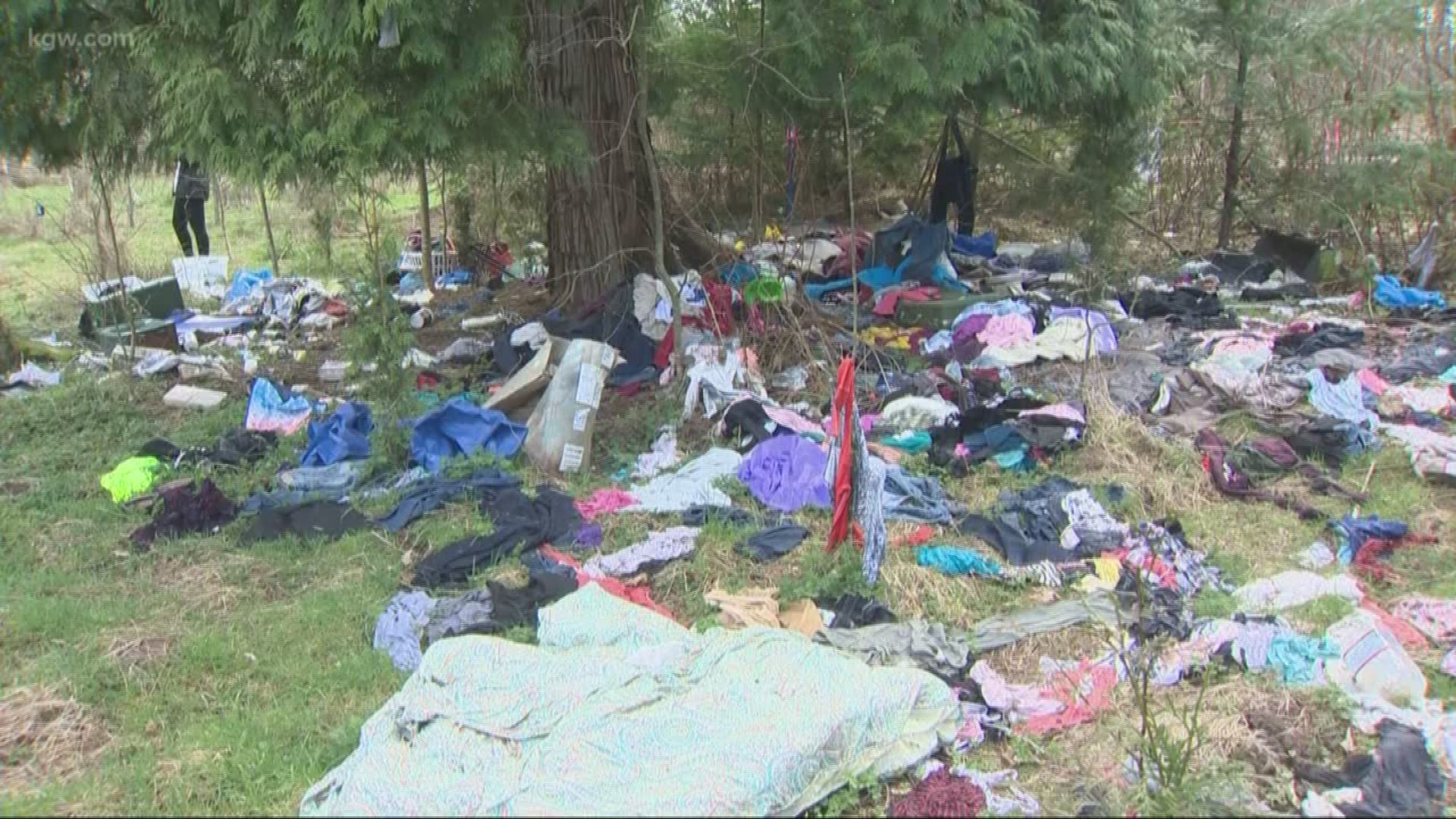GRESHAM, Ore. — A Gresham man is preparing to pay biohazard crews $8,000 plus extra fees, to come clean up the remnants of homeless camps that formed on his 42-acre property.
It will happen this weekend, and it’s not by choice.
“There are city ordinances that say the trash is mine, so I guess the trash is mine,” Scott Schaeffer said Friday.
The 70-year-old and his wife have lived on the property for nearly half a century, growing cedars and other trees for nurseries to stock.
The problem started in the last few years.
“It's so disheartening to see this mess,” he said, walking through the expansive wooded area behind his home.
Piles of clothes, tents, tarps, trash and other belongings cover the ground around trees.
One trunk, blackened and charred, had clearly been burned in a fire.
A nearby fallen cedar was dotted with asphalt shingles to allow campers easy crossing over Johnson Creek, which runs below.
Schaeffer’s property borders the Springwater Corridor and Metro-owned land.
He says campers come from both.
“There have been so many people down there, that my wife and I are both fearful of going down there,” he said.
Schaeffer said he and others had called police in years past, often at night.
Little was done to clear the camps he said.
Back in February, he says he and his wife returned from vacation to find a letter from the city.
“It says ‘issue a citation or civil penalty for up to $1000 per day, per violation,” he said, reading from the letter.
The letter listed two violations, totaling potential fines of $2,000 per day.
One was for allowing people to camp on his property for more than 72 hours; the other was for the trash.
“I thought I was being victimized,” he said. “It seems like it's a nationwide issue, the homeless. Every constituency in the United States is discussing the homeless issue, but yet, as a private land owner, I’m responsible for cleaning up the garbage.”
To avoid the fines, the city suggested Schaeffer remedy the problem by hiring companies equipped to handle hazardous materials often found in camps, including hypodermic needles and human waste.
One of the companies the city suggested quoted him $55,000.
The one he hired quoted him $8,000.
“The situation that occurred there, it did not happen overnight,” said Gresham city spokesperson Elizabeth Coffey.
Coffey said Friday the city rarely issues fines tied like the one nearly issued to Schaeffer.
She also said the issue could have been resolved earlier, adding Gresham police had been “in contact” with Schaeffer about the camps for “at least a year” before the city sent the letter.
Schaeffer denies that, claiming the letter was the first sign the issue was on the city’s radar.
Coffey noted there was no documentation to prove the prior contact, as an official file on Schaeffer’s case wasn’t opened until February, but she cited neighbor complaints going back months.
Tom Mostert, president of Clear Lake Neighborhood Association, confirmed via phone Friday he and other neighbors have complained to police and to the city about problems on Schaeffer’s property, including fights, screaming, fires and, at least once, gunshots.
“His refusal to deal with the situation has residual impact on the neighborhood right across the road, which is us,” Mostert said about Schaeffer. “We can’t just look the other way.”
Coffey added police helped Schaeffer clear campers from his property after the city issued the letter, offering each a bed in a shelter.
It’s part of the city’s push to address its portion of Oregon’s housing crisis.
In the last six months, she said the city of Gresham has been able to get more than seventy chronically homeless people off its streets, placing twenty in a shelter and more than fifty into permanent housing.
That said, she noted housed citizens are, now more than ever, responsible for monitoring the crisis’ effect on their private property.
“There were many opportunities where [Schaeffer] could have contacted our police officers, our code crew to have them come out and get these individuals connected to services and into housing before it grew into this large problem,” said Coffey. “For any homeowners out there, that see and are aware of illegal camping on their property, they need to notify us immediately.”
Schaeffer, who blames the public land bordering his for the influx of campers, said Friday he doesn’t want to make an enemy of the city.
But he’s worried this same problem will happen again.
“The homeless issue is huge, and no one seems to have a solution,” he said.
To report livability issues in the city of Gresham, officials recommend calling 503-618-2441 or going to www.greshamoregon.gov/mygresham.
You can also download the “My Gresham” app.

